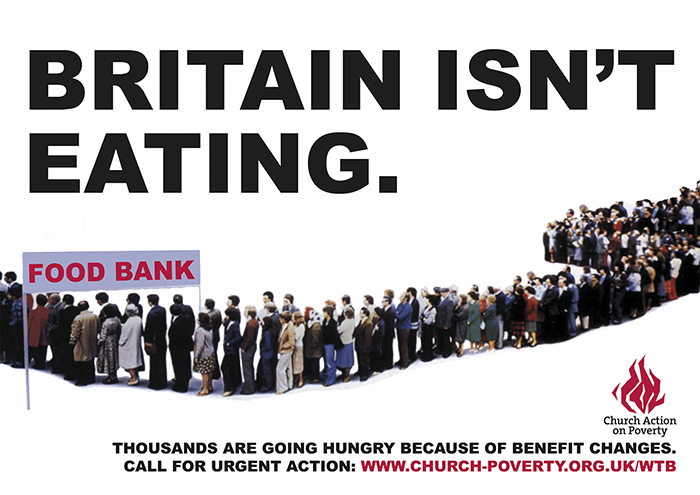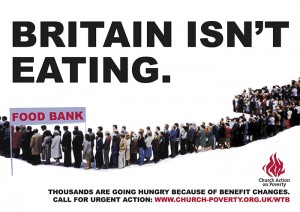Was emailed this article this morning and thought it was very relevant to share as we have been accessing the food bank service for some of our unaccompanied minors who are struggling with not being aloud to work or receive benefits. We also have people in our community that cannot afford London prices and yet again have to temporarily use this service.
This is a great article by Jon Kuhrt on Resistance & Rebewal website and he has given me permission to share this article.
The Labour government of the late 1970s will always be associated with economic failure, public sector strikes and the ‘winter of discontent’ when (as legend has it) the rubbish went uncollected and the dead unburied. When we see documentaries about the 1970s, they often include scenes of refuse piled up and picket lines accompanied by background music from The Sex Pistols or The Clash.
But in the future, when such programmes are produced about the 2010s, what footage will be used alongside the music of One Direction and Jessie J?
Well, I bet they’ll include scenes of people going into Foodbanks.
It’s a remarkable rise of profile for The Trussell Trust, the Christian charity who coordinate the 400 Foodbanks now operating in the UK. The network only started in 2004. I remember talking with the CEO Chris Mould at a conference in Salisbury shortly after it all started – I don’t think anyone could have predicted how significant their work would become.
The Tory response
The Tory government’s response to Foodbanks is fascinating. There are plenty of reasons why the Tories should love them. After all, Foodbanks embody the rhetoric of the ‘Big Society’ because they are all about local people responding to local need. Plus they don’t need government funding and are reliant on the generosity of volunteers and donations.
But the Tories do not love Foodbanks. And it’s because, similar to rough sleeping, they represent something scandalous: that in the UK today people need to queue up to receive hand-outs to feed their families. In these tough economic times, it’s a toxic image for a government who want to promote the idea that we are all in this together.
The official government report into the reasons for the rise in use of Foodbanks has seemingly been kicked into the long grass. And Chris Mould has repeatedly requested a meeting with the Minister Iain Duncan Smith to discuss the impact that the benefits reforms are having on the ground. IDS is adamant in his refusal to meet with them, refuting any link between the rise in Foodbank use and his benefit reforms. Just before Christmas he accused the Trussell Trust of ‘political scaremongering’.
Hungry Britain
It is a very telling reaction. After his failures as Tory leader, IDS has staked his entire political future on benefit reform. And he expects critique from liberal-left think tanks based in London. But it’s a different matter when a growing network of volunteer activists expose the reality of hungry Britain.
 It is an example of the significance of connecting community activism with social justice. It’s when the practical and the political are combined that we really rattle the cages of those in power. The rude and dismissive way that Tories has treated The Trussell Trust reminds me of the famous quote by Brazilian Archbishop Dom Helder Camara:
It is an example of the significance of connecting community activism with social justice. It’s when the practical and the political are combined that we really rattle the cages of those in power. The rude and dismissive way that Tories has treated The Trussell Trust reminds me of the famous quote by Brazilian Archbishop Dom Helder Camara:
‘When I give bread to the poor they call me a saint. When I ask why they are hungry, they call me a communist.’
It is not always easy to bring together community action and social justice. Often the straightforward messages required in political debate and campaigning do not always go well with the messy realities of the front line. But the front line is ultimately where truth is revealed. It is hard to spin the fact that over 500,000 people have used Food banks in the last year.
The role of faith
And of course, Christianity has a huge role to play in these debates. As well as being the catalyst and the engine of so much community action, there is a growing willingness of Christian activists to question the deeper issues of social injustice. The Church Action on Poverty poster above embodies this synthesis of practical and political: we have a right to speak up because we are on the front line of addressing the issues. It embodies what Desmond Tutu said:
‘Christians should not just be pulling people out of the river; we must go up-stream and find out who is pushing them in.’
The Summit – Christians on the Left’s community launch
These themes of faith, community action and social justice are the core issues to be discussed at ‘The Summit’, an important conference which includes the public launch ofChristians on the Left. It is being held at The Vauxhall foodbank in South London at5.30pm on February 18th. I will be speaking alongside Chris Mould, Matt Barlow fromChristians Against Poverty, Alison Gelder from Housing Justice and others. They’ll be lots of opportunity for discussing these key issues. See here for more information.


